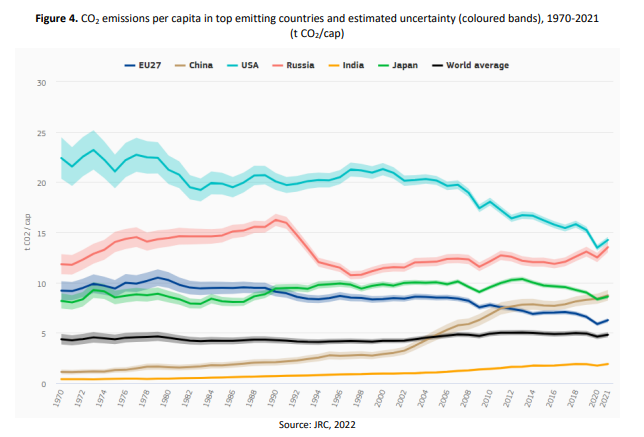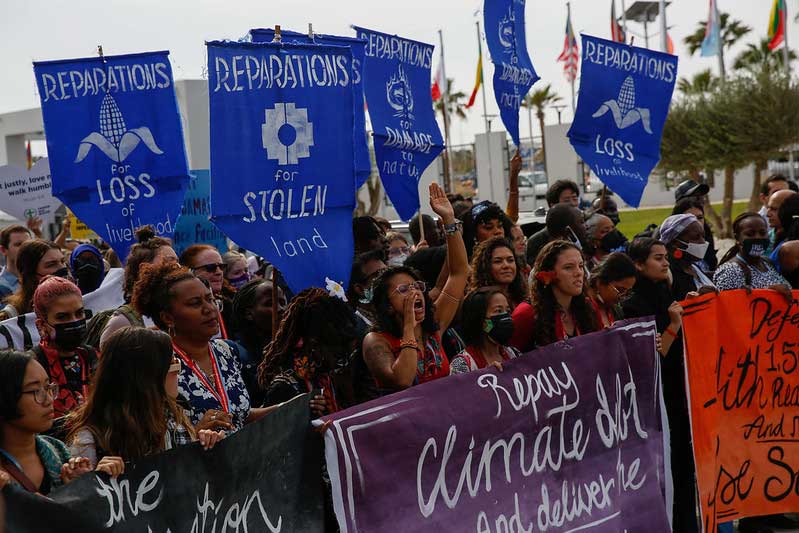This year’s UN Climate Change Conference was overshadowed by state repression and the obstruction of civil society mobilisations, as well as by the greenwashing and cover-up policies of over 600 participating lobbyists from the oil and gas industry. Immediately after COP27, a seminar co-organised by transform! europe on climate justice took place.
Roland Kulke reports from the seminar “Climate Justice for Africa: Building a Global Solidarity Movement”, which took place online on 21 and 22 November and was organised by transform! europe, Egypt’s Socialist People’s Alliance, Global Justice Now, and Acción Ecológica Ecuador:
The UN Climate Change Conference (also known as the Conference of the Parties of the UNFCCC or COP27) ended late on 20th November 2022 in Sharm el-Sheikh, Egypt. The most important outcome of COP27 is that countries of the Global South managed to establish, after three decades of struggle, the Loss and Damage Fund, which will provide immediate financial assistance to the countries most affected by climate warming. This is a real achievement, as the fund could compensate people in poor regions and countries of the world which suffer enormously from floods and heat waves, as we have seen recently in Pakistan.
Sandeep Chachra, Director of ActionAid India, says: “The decision to establish the Damage and Loss Fund, taken at the UN Climate Change Conference in Sharm el-Sheikh, is a historic outcome. The G77 – the negotiating group of 134 countries representing over five billion of the world population – has best demonstrated this solidarity. The Global South has stood firmly in support of the establishment of this fund.”
Chachra took part as one of the speakers at the online seminar organised by transform! europe, Egypt’s Socialist People’s Alliance, Global Justice Now, and Acción Ecológica Ecuador, which took place after COP27 on 21–22 November 2022. The conference was originally planned to take place on site in Cairo, but it fell under the surveillance of the Egyptian security body, who then forced the organisers to cancel the event on short notice. Therefore, in compliance with strict security measures, we had to switch to holding the conference online.
The first of four panels discussed the poor results of COP27. Afterwards, the participants discussed which rules in the international economy prevent climate justice and what needs to be changed in order to adequately address climate change. The third panel was dedicated to the question of how we can strengthen democracy and social justice, while the last panel focused on how we can strengthen solidarity-based cooperation after COP27. More on this below.
At the seminar, Dorothy Guerrero, Head of Policy with Global Justice Now, discussed the open problems with the Loss and Damage Fund: who should pay and who should benefit?
On the one hand, the Western industrialised countries want China to contribute, and on the other, they want only Small Island Developing States, Least Developed Countries and Climate Vulnerable States to benefit. This taxonomy is highly unfair, as Pakistan would not be entitled to financial aid but just experienced one of the worst climate disasters in its history this summer. This flood alone caused $14.9 billion of damage and $15.2 billion of economic losses. Should China pay in? China’s emissions have only grown significantly since it joined the WTO in 2001 and its per capita emissions are catching up to First World level only recently1.

It is also just as important to stress that capital is unequally distributed. Immense fortunes have been made possible by the fossil capitalism of the last 200 years. The world’s top five oil companies alone made $170 billion in profits this year. This money must be shifted to the Loss and Damage Fund.
Many of the speakers at the seminar followed the presentation of co-organiser Mamdouh Habashi and discussed the concerns he brought up about the current geopolitical situation. During COP27, the EU threatened to leave the negotiations altogether. The aim was to remove China from the bloc of the Global South, whose interests are defended by the so-called G77 group. It was clear to the 134 countries represented in the G77 group that if the Western countries succeeded in separating China, then the South would be divided and would be broken up by the North into ever smaller “bites”. Divide and rule is the traditional way of domination of imperial powers. It is a great result from COP27 that the South has not been divided. What may have contributed to this is that the countries of the Global South remember too well who supplied them with vaccines in the COVID-19 pandemic – namely China and Russia, not the West.
Apart from the assurance that there will be a fund for loss and damage, the results delivered by COP27 have been less than tangible. Since the Paris Agreement in 2015, CO2 emissions have risen year after year, with the exception of 2020 because of COVID-19. This means that there is simply no real climate protection so far… On the contrary, more and more resources are being consumed, mountains of waste are growing and there are no legal and enforceable obligations to reduce CO2 emissions.
After two days of discussion, the participants were realistic: COP27 has largely failed to deliver the transformative decisions urgently needed to save the climate. There are no further plans or even commitments on how to reduce emissions worldwide. Instead, we are stuck with “business as usual”. Pablo Solon, of Fundación Solon, Bolivia, said clearly: “Lobbying is no longer helpful. We need pressure from below, pressure from the streets.” Co-organiser of the seminar Fatma Khafagy also brought into the discussion the need for the broad involvement of women and their organisations at all levels of climate policy.
The online seminar ended with the statement that a real counter-summit and joint civil society mobilisation is needed, as the COP lacks effective results and real climate action. We now want to work on this in 2023.
Figure reference
1figure 4, p.10, in: European Commission, Joint Research Centre, ”CO2 emissions of all world countries – 2022 Report” (EUR 31182 EN)



